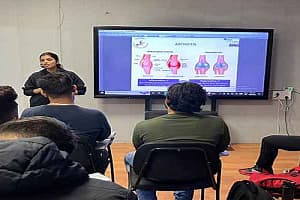Everything you need to know about ‘Vitamins’

Dr. Chirag Sethi and Mrinalini Agarwal
Director, Content Creator, Classic Fitness Academy, New Delhi
Reading this blog, most of your queries about what vitamins are, how many types are there, why are they essentials and how can you give your body the vitamins it needs will be cleared.
Now eventually, this article isn’t a prescription, we are talking about in general for your knowledge to understand the term ‘vitamins’.
So, let's first start with
What are vitamins?
Vitamins refer to an organic compound that people need in their diet in small quantities.
Most vitamins come from food because either our bodies don't produce them or even if they do they produce a very little amount.
Also, when we talk about vitamins having a vitamin in less portion or excessive portion can risk developing certain health issues.
Remember anything in access can be harmful too right??
A vitamin is an organic compound, which means that it also contains carbon. But it is also an essential nutrient that the body may need to get from food. 
Now that we know what our vitamins are, let's talk about the types.
With covid and other issues, we are sure people are spiking up their knowledge on healthy food, supplements, and even knowledge about what vitamins help fight cold, cough, fever, etc.
So most of you reading this would eventually be very well aware of what Vitamin-C is, yes it indeed does help in making the immune system better, but we so far have to closure to why people were inducing it in their noses.
Getting back onto how many types of vitamins are there,
Currently, we have 13 vitamins recognized. 
Firstly will be dividing them regarding their properties, fat-soluble and water-soluble, then we will be talking about each one of them:
• water-soluble vitamins
These vitamins basically do not stay in the body for long, they cannot be stored in our bodies either. The way for them to get out is through urine, hence they are water-soluble and because of this only reason that it doesn’t stay in the body for too long people need to consume more of this kind of vitamin than the other which is called fat-soluble, about which we will be reading next.
When we talk about water-soluble vitamins they are Vitamin-C and B
• fat-soluble vitamins
Now with these kinds of vitamins, as it speaks for itself fat-soluble it stays in the fatty tissues and the liver and with these types of vitamins they can stay in the body for days and even for months sometimes. Dietary fats eventually help our bodies to absorb these kinds of vitamins through our intestinal tract. 
Now let's talk about the 13 Vitamins that we know exist:
Starting with Vitamin - A
Its ‘chemical names’ are retinol, retinal, the four carotenoids, beta carotene.
It is a fat-soluble kind.
What does it do and why do we need it?
It is indeed essential for our eye health. Its deficiency may lead to various health issues like night blindness and keratomalacia, which turn the front layer of the eye dry and cloudy.
Resources where you can get it from Some Cheeses, eggs, pumpkins, collard greens, melons, milk, cod liver oil, carrots, broccoli, sweet potatoes, and even butter. 

Next, we will be talking about Vitamin B1
Its ‘Chemical name’: thiamine.
It is a water-soluble kind
What does it do and why we need it?
It is indeed an essential vitamin for producing various enzymes that help break down blood sugar.
If we don’t take it in an adequate amount this may cause beriberi and we’re nicke-korsakoff syndrome.
Resources where you can get from:
We can get from the yeast, cereal, grains, sunflower seeds, brown rice, cauliflower, potatoes, oranges, eggs, etc
Vitamin B-2:
Chemical name: Riboflavin
It is Water Soluble kind
What does it do and why do we need it?
So B-2 plays an important rather essential role in the growth and development of body cells and helps metabolize food. With the deficiency of this one, you could face inflammation in lips and weird dryness mouth.
Resources where you can get it from bananas, okra (bhindi), eggs, fish, milk, curd, paneer, green beans, etc
Vitamin B-3:
Chemical name: niacinamide
It is Water Soluble kind
What does it do and why do we need it?
So, Niacin, is a nutrient that the body needs in very small amounts to function and keep the body healthy. These enzymes work on skin, nerves, and the digestive system too. Fun Fact: niacin is also called nicotine acid in vit-b3. If not taken adequately, it could result in diarrhea, skin issues, and intestinal issues.
Resources where you can get it from fish like tuna, salmon, eggs, tomatoes, carrots, milk, chicken, lentils even tofu
Vitamin B-5:
Chemical name: Pantothenic acid
It is Water Soluble kind
What does it do and why do we need it?
So this one produces energy and hormones for our body, it could cause paresthesia which means (an abnormal sensation, typically tingling or pricking (‘pins and needles’), caused chiefly by pressure on or damage to peripheral nerves.)
Resources where you can get it from meat, whole grains, etc
Vitamin B-6:
Chemical name: pyridoxine, pyridoxamine, pyridoxal.
It is Water Soluble kind
What does it do and why do we need it?
So this one plays a vital role in the formation of red blood cells in our body, as knowing its function what it does it's easy to make out the deficiency of this one would cause anemia and peripheral neuropathy (weakness, numbness, and pain from nerve damage, usually in the hands and feet)
Resources where you can get it from bananas, nuts even chickpeas
Vitamin B-7:
Chemical name: Biotin
It is Water Soluble kind
What does it do and why do we need it?
It does not only contribute to keratin, yes, the one involved with hair and skin, It overall helps in enabling the body to metabolize proteins, fats, and carbs. The deficiency of this one would cause inflammation in the intestines or dermatitis (inflammation of the skin)
Resources where you can get it from cheese, egg yolk, broccoli, spinach, etc
Vitamin B-9:
Chemical name: folic acid, folinic acid.
It is Water Soluble kind
What does it do and why do we need it?
Doctors generally recommend folic acid supplements during or even before the pregnancy, because they can affect the fetus’s nervous system. Now this one is essential to make DNA and RNA.
Resources where you can get it from sunflower seeds, leafy vegetables, etc
Vitamin B-12:
Chemical Name: cyanocobalamin, hydroxocobalamin, methylcobalamin.
It is Water Soluble kind
What does it do and why do we need it?
This one is essentials for a healthy nervous system, it could cause neurological problems if not taken in an adequate amount. For vegans, since most of the sources are dairy or meat, doctors recommend them b-12 supplements.
Resources where you can get it from dairy products, eggs, meat, fish, nutritional yeast, etc 
Vitamin D:
Chemical name: ergocalciferol, cholecalciferol
It is fat-soluble
What does it do and why do we need it?
We all hear about how vitamin D is so important for our bones; it is indeed a necessity for healthy mineralization of bones. Deficiency of this could obviously cause softening of bones, rickets and osteomalacia (softening of the bones, typically through a deficiency of vitamin D or calcium)
Resources where you can get it from: Go into the sun if you want vitamin D right? yes, so UVB rays from the sun or even other courses could help, egg yolk, some mushrooms and fatty fish etc.
Vitamin E:
Chemical name: ergocalciferol, cholecalciferol
It is fat-soluble
What does it do and why do we need it?
We all hear about how vitamin D is so important for our bones; it is indeed a necessity for healthy mineralization of bones. Deficiency of this could obviously cause softening of bones, rickets and osteomalacia (softening of the bones, typically through a deficiency of vitamin D or calcium)
Resources where you can get it from: Go into the sun if you want vitamin D right? yes, so UVB rays from the sun or even other courses could help, egg yolk, some mushrooms and fatty fish etc.
Vitamin E:
Chemical name: tocopherol, tocotrienol
It is fat-soluble
What does it do and why do we need it?
Because of its antioxidant activity helps prevents oxidative stress, it is referred to as an issue that increases the risk of widespread inflammation and other diseases. The deficiency causing diseases is rare, but it could be in newborn babies called hemolytic anemic in which the blood cells are destroyed.
Resources where you can get it from: Kiwi, almonds, eggs, nuts etc
Vitamin K:
Chemical name: phylloquinone, menaquinone
It is fat-soluble
What does it do and why do we need it?
It functions in blood clotting, without its unusual bleeding could occur.
Resources where you can get it from: figs, leafy greens, pumpkins etc






